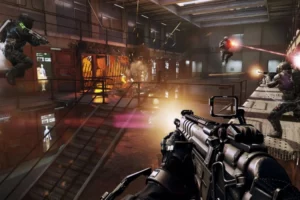The pixelated battlefields of video games can ignite thrilling adventures, forge lasting friendships, and even sharpen our thinking skills. But alongside these benefits, a persistent shadow lurks: the concern that violent video games might fuel aggression in real life. This complex issue has ignited heated debates, fueled by conflicting research and passionate opinions. So, where do we stand amidst this pixelated puzzle? Let’s delve into the murky waters of research and explore the nuanced relationship between violent video games and aggression.
A Maze of Correlations:
Studies investigating the link between violent video games and aggression often reveal correlations, but correlation doesn’t equal causation. Just because players who enjoy violent games tend to score higher on aggression tests doesn’t mean the games are directly causing the aggression. Numerous factors like pre-existing personality traits, social environment, and even genetics can play a role in shaping aggressive behavior.
Unpacking the Research:
The research landscape is far from black and white. While some studies suggest a small, temporary increase in aggression after playing violent games, others find no such effect. Moreover, methodological limitations often plague these studies, raising concerns about their generalizability and validity.

Beyond the Binary:
The simplistic “violent games cause aggression” narrative ignores the multifaceted nature of human behavior. Factors like individual differences, game design, content exposure, and real-life experiences all interact in complex ways, making it difficult to pinpoint any single factor as the sole driver of aggression.
Beyond the Lab:
Laboratory experiments, while valuable tools, can create artificial and restricted environments that don’t always reflect real-world gameplay experiences. Long-term observational studies and nuanced analyses of player motivations and engagement offer a more holistic understanding of the multifaceted relationship between games and aggression.
Building Bridges, Not Walls:
Instead of fueling fear and animosity, the discussion should focus on fostering critical thinking, media literacy, and open communication between parents, educators, and gamers. Educating players about responsible gaming practices, promoting diverse experiences beyond solely violent games, and creating healthy gaming environments are crucial steps toward addressing concerns and empowering individuals to make informed choices.
The Unwritten Sequel:
The research on video games and aggression is a dynamic story still being written. While definitive answers may remain elusive, ongoing research, coupled with responsible gaming practices and open dialogue, can help us navigate this complex issue constructively. Remember, just like a well-designed video game, navigating this debate requires critical thinking, collaboration, and a willingness to explore beyond the surface pixels.
















Add Comment